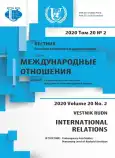Regionalism in the Modern World Economy: Evolution and Main Trends
- Authors: Kostyunina G.M.1
-
Affiliations:
- MGIMO University
- Issue: Vol 20, No 2 (2020): Contemporary Area Studies: Overcoming Level-of-Analysis Eclecticism
- Pages: 303-317
- Section: THEMATIC DOSSIER
- URL: https://journal-vniispk.ru/2313-0660/article/view/320215
- DOI: https://doi.org/10.22363/2313-0660-2020-20-2-303-317
- ID: 320215
Cite item
Full Text
Abstract
The proposed article is aimed at identifying the essence, history of development and evaluation of the current stage of regionalism. The principles of the theory of economic integration are briefly outlined, including its forms and their practical implementation. The author discusses the regulation of integration agreements within the framework of the GATT - WTO multilateral trade system. The motives for the participation of states in integration agreements, such as strategic, political and economic ones, as well as participation of the country in global and / or regional value of chains, are examined in detail. The author characterizes the main trends of modern regionalism and well-known integration mega-projects, such as the Trans-Pacific Partnership, and the Regional Comprehensive Economic Partnership. The main results of the study, which the author came to: 1) regionalism is a politics, and regionalization is the process of uniting countries into a larger region with elements of the free movement of certain factors; 2) old regionalism reflected the goals of promoting the growth of international trade and ensuring security. It corresponds to the concept of “shadow” integration; 3) the new regionalism was the result of an integrated approach to the development of globalization and a multipolar world. It is characterized by the concept of “deep” integration with deeper integration processes; 4) when signing the RTAs, the country takes into account strategic, political and economic factors; 5) integration agreements vary in scope and structure, reflecting the growing differentiation of the global trading system and the diversity of bilateral and multilateral regional trade agreements; 6) the signing of mega-projects reduces the effect of “spaghetti bowl” due to a decrease in the number of bilateral integration agreements between countries and the development of general rules of trade, and also simplifies international commercial disputes; there is a gradual unification of not only the rules of law, but also their interpretation and application.
About the authors
Galina Mikhailovna Kostyunina
MGIMO University
Author for correspondence.
Email: galina_kostynina@yahoo.com
PhD in Economics, Dr. of Sc., Professor, Professor, the Department of International Economic Relations and Foreign Economic Relations
Moscow, Russian FederationReferences
- Baier, S., Bergstrand, J. & Egger, P. (2007). The New Regionalism: Causes and consequences. Dans Économie international, 1 (#109), 9—29.
- Balassa, B. (1969). The Theory of Economic Integration. 3rd edition. London: George Allen & Unwin.
- Barbieri, G. (2019). Regionalism, Globalism and Complexity: A Stimulus towards Global IR? Third World Thematics: A TWO Journal, 4 (6), 424—441. DOI: https://doi.org/10.1080/23802014.2019.1685406
- Bergsten, C.F. (1995). Competitive Liberalization and Global Free Trade: A Vision for the Early 21st Century. Working Paper, 96—15. Washington, DC: Institute for International Economics.
- Bhagwati, J. & Panagariya, A. (Eds.). (1999). Preferential Trading Areas and Multilateralism: Strangers, Friends or Foes? Cambridge, MA: MIT Press. doi: 10.1142/9789812815330_0002
- Burfisher, E., Robinson, Sh. & Thierfelder, K. (2003). Regionalism: Old and New, Theory and Practice. The International Agricultural Trade Research Consortium (IATRC) Conference. Italy, June. URL: https://www.ictsd.org/sites/default/files/downloads/2008/04/burfisherrobinsonthierfelder.pdf (accessed: 12.01.2020).
- Grossman, G. & Helpman, E. (1995). The Politics of Free Trade Agreements. American Economic Review, 85 (4), 667—690.
- He, F., Yang, P. (2015). China’s Role in Asia’s Free Trade Agreements. Asia and the Pacific Policy Studies, 2 (2), 416—424. DOI: https://doi.org/10.1002/app5.66
- Kaiser, W. (1999). Using Europe, Abusing Europeans: Britain and European Unity, 1945—63. Basingstoke: Palgrave Macmillan.
- Kang, Y.-D. (2016). Development of Regionalism: New Criteria and Typology. Journal of Economic Integration, 31 (2), 234—274. DOI: http://dx.doi.org/10.11130/jei.2016.31.2.2342016
- Kostyunina, G.M. & Baronov, V.I. (2018). China’s Regional Integration Agreements in the Framework of Model “South—South”. Vestnik RUDN. International Relations, 18 (3), 612— 627. doi: 10.22363/2313-0660-2018-18-3-612-627. (In Russian).
- Li, Y. (2015). China’s Free Trade Agreement Diplomacy. PhD Thesis. The University of Adelaide, School of Social Sciences. doi: 10.4225/55/58af695f326d2. URL: https://digital.library.adelaide.edu.au/dspace/handle/2440/103486 (accessed: 12.01.2020).
- Mikheev, V.V. (2002). Globalization, Regionalization and Regional Integration. In: Voskressenski, A.D. (Eds.). East — West: Regional Systems and Regional Problems of International Relations. Moscow: ROSSPEN publ. P. 61—78. (In Russian).
- Portansky, A.P. (2011). Regionalism in the World and Integration in CIS. Russian Foreign Economic Journal, 11, 8—17. (In Russian).
- Powell, S. & Low, T. (2011). Is the WTO Quietly Fading Away? The New Regionalism and Global Trade Rules. The Georgetown Journal of Law & Public Policy, 9, 261—282.
- Shishkov, Yu.V. (2001). Integration Processes on the Threshold of the 21st Century. Why CIS Countries Are Not Integrating? Moscow: III tysyacheletie publ. (In Russian).
- Siebert, H. (2003). What Does Globalization Mean for the World Trading System? Kiel Working Paper, 856.
- Streltsov, D.V. (2012). Japan between East Asian and Trans-Pacific Regionalism. Moscow University Bulletin of World Politics, 3, 72—95. (In Russian).
- Summers, L. (1991). Regionalism and the World Trading System. Policy Implications of Trade and Currency Zones. Federal Reserve Bank of Kansas City.
- Tarrow, S., Katzenstein, P.J. & Graziano, L. (1978). Territorial Politics in Industrial Nations. N.Y., London: Praeger Publishers.
- The Report of the First Warwick Commission. (2007). The Multilateral Trade Regime: Which Way Forward? The University of Warwick.
- Udbye, A. (2017). The United States Free Trade Agreements. How Successful Have They Been? The International Trade Journal, 31 (5), 457—758. DOI: doi.org/10.1080/08853908.2017.1362365
Supplementary files









